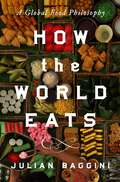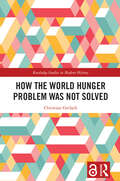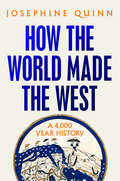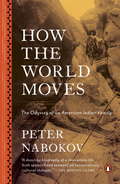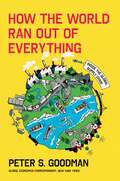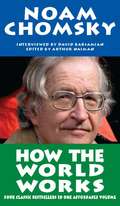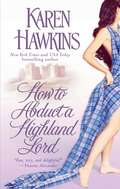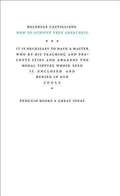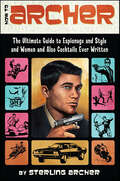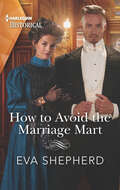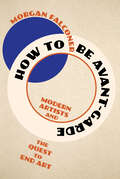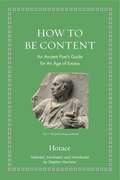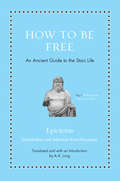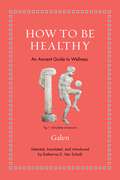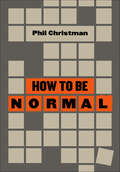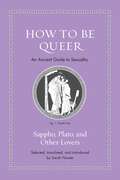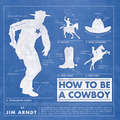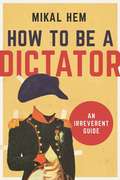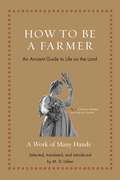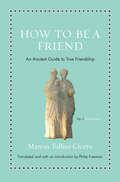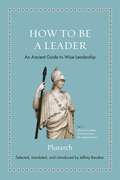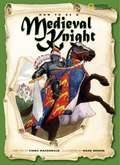- Table View
- List View
How the World Eats: A Global Food Philosophy
by Julian BagginiFrom the bestselling author of How the World Thinks, an exploration of how we grow, make, buy and eat our food around the world—and a proposal for a global philosophy of food.How we live is shaped by how we eat. You can see this in the vastly different approaches to growing, preparing and eating food around the world, such as the hunter-gatherer Hadza in Tanzania whose sustainable lifestyle is under threat in a crowded planet, or Western societies whose food is farmed or bred in vast intensive enterprises. And most of us now rely on a complex global food web of production, distribution, consumption and disposal, which is now contending with unprecedented challenges. The need for a better understanding of how we feed ourselves has never been more urgent. In this wide-ranging and definitive book, philosopher Julian Baggini expertly delves into the best and worst food practises in a huge array of different societies, past and present. His exploration takes him from cutting-edge technologies, such as new farming methods, cultured meat, GM and astronaut food, to the ethics and health of ultra processed food and aquaculture, as he takes a forensic look at the effectiveness of our food governance, the difficulties of food wastage and the effects of commodification. Extracting essential principles to guide how we eat in the future, How the World Eats is a thought-provoking and illuminating call for a pluralistic, humane, resourceful and equitable global food philosophy that will guide us towards a food system fit for the twenty-first century and beyond.
How the World Hunger Problem Was not Solved (Routledge Studies in Modern History)
by Christian GerlachThe world food crisis (1972–1975) gave rise to new development concepts. To eradicate world hunger, small peasants were supposed to use ‘modern’ inputs like high-yielding seeds, fertilizer, pesticides and irrigation. This would turn subsistence producers into business owners, transform rural areas, invigorate national economies and the crisis-stricken world economy and thus stabilize capitalism.Together with an in-depth account of the world food crisis, this book analyses how this global scheme largely failed. It shows its diverse initiators, their reasoning and motives, its political breakthrough, the degrees to which it was implemented globally and nationally in the following decades and its socioeconomic effects in rural areas. Despite internationally coordinated policies and coercive means, the scheme failed on all levels: situation analysis, design, policies, incapable institutions (including big business), implementation and peasants’ responses. Selective realization in certain regions and for certain crops and the appropriation of funds by local elites often aggravated inequality and hunger. Case studies are about Bangladesh, Indonesia, Tanzania and Mali. The book shows limits to global social engineering, imperialism and state control.It is aimed at students, scholars, activists and non-specialists interested in development and the world food problem.
How the World Made the West: A 4,000 Year History
by Josephine QuinnAn award-winning Oxford history professor &“makes a forceful argument and tells a story with great verve&” (The Wall Street Journal)—that the West is, and always has been, truly global.&“Those archaic &‘Western Civ&’ classes so many of us took in college should be updated, argues Quinn, [who] invites us to . . . revel in a richer, more polyglot inheritance.&”—The Boston GlobeAN ECONOMIST BEST BOOK OF THE YEARIn How the World Made the West, Josephine Quinn poses perhaps the most significant challenge ever to the &“civilizational thinking&” regarding the origins of Western culture—that is, the idea that civilizations arose separately and distinctly from one another. Rather, she locates the roots of the modern West in everything from the law codes of Babylon, Assyrian irrigation, and the Phoenician art of sail to Indian literature, Arabic scholarship, and the metalworking riders of the Steppe, to name just a few examples.According to Quinn, reducing the backstory of the modern West to a narrative that focuses on Greece and Rome impoverishes our view of the past. This understanding of history would have made no sense to the ancient Greeks and Romans themselves, who understood and discussed their own connections to and borrowings from others. They consistently presented their own culture as the result of contact and exchange. Quinn builds on the writings they left behind with rich analyses of other ancient literary sources like the epic of Gilgamesh, holy texts, and newly discovered records revealing details of everyday life. A work of breathtaking scholarship, How the World Made the West also draws on the material culture of the times in art and artifacts as well as findings from the latest scientific advances in carbon dating and human genetics to thoroughly debunk the myth of the modern West as a self-made miracle.In lively prose and with bracing clarity, as well as through vivid maps and color illustrations, How the World Made the West challenges the stories the West continues to tell about itself. It redefines our understanding of the Western self and civilization in the cosmopolitan world of today.
How the World Moves
by Peter NabokovA compelling portrait of cultural transition and assimilation via the saga of one Acoma Pueblo Indian familyBorn in 1861 in New Mexico's Acoma Pueblo, Edward Proctor Hunt lived a tribal life almost unchanged for centuries. But after attending government schools he broke with his people's ancient codes to become a shopkeeper and controversial broker between Indian and white worlds. As a Wild West Show Indian he travelled in Europe with his family, and saw his sons become silversmiths, painters, and consultants on Indian Lore. In 1928, in a life-culminating experience, he recited his version of the origin myth of Acoma Pueblo to Smithsonian Institution scholars.Nabokov narrates the fascinating story of Hunt's life within a multicultural and historical context. Chronicling Pueblo Indian life and Anglo/Indian relations over the last century and a half, he explores how this entrepreneurial family capitalized on the nation's passion for Indian culture. In this rich book, Nabokov dramatizes how the Hunts, like immigrants throughout history, faced anguishing decisions over staying put or striking out for economic independence, and experienced the pivotal passage from tradition to modernity.
How the World Moves: The Odyssey of an American Indian Family
by Peter NabokovA compelling portrait of cultural transition and assimilation via the saga of one Acoma Pueblo Indian familyBorn in 1861 in New Mexico's Acoma Pueblo, Edward Proctor Hunt lived a tribal life almost unchanged for centuries. But after attending government schools he broke with his people's ancient codes to become a shopkeeper and controversial broker between Indian and white worlds. As a Wild West Show Indian he travelled in Europe with his family, and saw his sons become silversmiths, painters, and consultants on Indian Lore. In 1928, in a life-culminating experience, he recited his version of the origin myth of Acoma Pueblo to Smithsonian Institution scholars.Nabokov narrates the fascinating story of Hunt's life within a multicultural and historical context. Chronicling Pueblo Indian life and Anglo/Indian relations over the last century and a half, he explores how this entrepreneurial family capitalized on the nation's passion for Indian culture. In this rich book, Nabokov dramatizes how the Hunts, like immigrants throughout history, faced anguishing decisions over staying put or striking out for economic independence, and experienced the pivotal passage from tradition to modernity.
How the World Ran Out of Everything: Inside the Global Supply Chain
by Peter S. GoodmanBy the New York Times’s Global Economics Correspondent, an extraordinary journey to understand the worldwide supply chain—exposing both the fascinating pathways of manufacturing and transportation that bring products to your doorstep, and the ruthless business logic that has left local communities at the mercy of a complex and fragile network for their basic necessities."A tale that will change how you look at the world." —Mark LeibovichOne of Foreign Policy's "Most Anticipated Books of 2024"How does the wealthiest country on earth run out of protective gear in the middle of a public health catastrophe? How do its parents find themselves unable to locate crucially needed infant formula? How do its largest companies spend billions of dollars making cars that no one can drive for a lack of chips?The last few years have radically highlighted the intricacy and fragility of the global supply chain. Enormous ships were stuck at sea, warehouses overflowed, and delivery trucks stalled. The result was a scarcity of everything from breakfast cereal to medical devices, from frivolous goods to lifesaving necessities. And while the scale of the pandemic shock was unprecedented, it underscored the troubling reality that the system was fundamentally at risk of descending into chaos all along. And it still is. Sabotaged by financial interests, loss of transparency in markets, and worsening working conditions for the people tasked with keeping the gears turning, our global supply chain has become perpetually on the brink of collapse.In How the World Ran Out of Everything, award-winning journalist Peter S. Goodman reveals the fascinating innerworkings of our supply chain and the factors that have led to its constant, dangerous vulnerability. His reporting takes readers deep into the elaborate system, showcasing the triumphs and struggles of the human players who operate it—from factories in Asia and an almond grower in Northern California, to a group of striking railroad workers in Texas, to a truck driver who Goodman accompanies across hundreds of miles of the Great Plains. Through their stories, Goodman weaves a powerful argument for reforming a supply chain to become truly reliable and resilient, demanding a radical redrawing of the bargain between labor and shareholders, and deeper attention paid to how we get the things we need.From one of the most respected economic journalists working today, How the World Ran Out of Everything is a fiercely smart, deeply informative look at how our supply chain operates, and why its reform is crucial—not only to avoid dysfunction in our day to day lives, but to protect the fate of our global fortunes.
How the World Works
by Noam Chomsky David Barsamian Arthur NaimanAccording to The New York Times, Noam Chomsky is arguably the most important intellectual alive. " But he isn't easy to read . . . or at least he wasn't until these books came along. Made up of intensively edited speeches and interviews, they offer something not found anywhere else: pure Chomsky, with every dazzling idea and penetrating insight intact, delivered in clear, accessible, reader-friendly prose. Published as four short books in the famous Real Story series---What Uncle Sam Really Wants; The Prosperous Few and the Restless Many; Secrets, Lies and Democracy; and The Common Good---they've collectively sold almost 600,000 copies. And they continue to sell year after year after year because Chomsky's ideas become, if anything, more relevant as time goes by. For example, twenty years ago he pointed out that "in 1970, about 90% of international capital was used for trade and long-term investment---more or less productive things---and 10% for speculation. By 1990, those figures had reversed. " As we know, speculation continued to increase exponentially. We're paying the price now for not heeding him them.
How to Abduct a Highland Lord (The MacLean Curse Series #1)
by Karen HawkinsIn a delightfully sexy and witty series, New York Times and USA TODAY bestselling author Karen Hawkins creates an unforgettable couple locked in a marriage that begins with a desperate feud—and ends in seduction.It’s hardly the type of wedding Fiona MacLean dreamed of. No family, no guests, just a groom who’s been dragged—literally—to the altar. But if marriage to Black Jack Kincaid, the handsome wastrel she’d sworn never to see again, will avert a bloody war between their clans, so be it. Surely she can share his bed without losing her heart… Known throughout Scotland and London as a wild rogue, Jack is accustomed to waking in dire situations, but…married? Long ago, he and Fiona reveled in a youthful passion. Now, the fiery, sensual lass is his once more. And though their marriage is in name only, Jack is determined to win her forever—body and soul…
How to Achieve True Greatness
by Baldesar CastiglioneThroughout history, some books have changed the world. They have transformed the way we see ourselves - and each other. They have inspired debate, dissent, war and revolution. They have enlightened, outraged, provoked and comforted. They have enriched lives - and destroyed them. Now Penguin brings you the works of the great thinkers, pioneers, radicals and visionaries whose ideas shook civilization and helped make us who we are.
How to Archer: The Ultimate Guide to Espionage and Style and Women and Also Cocktails Ever Written
by Sterling ArcherLying is like 95% of what I do. But believe me: in this book, I’ll let you know exactly how to become a master spy just like me. Obviously, you won’t be as good at it as I am, but that’s because you’re you, and I’m Sterling Archer. I know, I know, it sucks not being me. But don’t beat yourself up about it, because I’m going to show you all the good stuff—what to wear; what to drink; how to seduce women (and, when necessary, men); how to beat up men (and, when necessary, women); how to tell the difference between call girls and hookers (hint: when they’re dead, they’re just hookers) and everything about weapons, secret devices, lying ex-girlfriends, and turtlenecks. In a word? How to Archer.
How to Avoid the Marriage Mart (Breaking the Marriage Rule #3)
by Eva ShepherdA notorious rakeMeets a spirited spinster…At a weekend shooting party, where the guests are as determined to bag a marriage partner as they are a pheasant, two attendees are under siege. The Duke of Kingsford from a clutch of desperate debutantes, and Charlotte FitzRoy from her matchmaking mother! A pretend courtship between them should keep the others at bay, but an unexpected, impassioned kiss may just bring about the marriage they both sought to avoid!From Harlequin Historical: Your romantic escape to the past. Breaking the Marriage RulesBook 1: Beguiling the DukeBook 2: Awakening the DuchessBook 3: Aspirations of a Lady’s MaidBook 4: How to Avoid the Marriage Mart
How to Be Avant-Garde: Modern Artists and the Quest to End Art
by Morgan FalconerOne of Literary Hub's Most Anticipated Books of 2025 The strange story of the twentieth-century artists who sought to destroy art by transforming it into the substance of everyday life. “Art has poisoned our life,” proclaimed Dutch artist and De Stijl cofounder Theo van Doesburg. Reacting to the tumultuous crises of the twentieth century, especially the horrors of World War I, avant-garde artists and writers sought to destroy art by transforming it into the substance of everyday life. Following the evolution of these revolutionary groups, How to Be Avant-Garde charts its pioneers and radical ideas. From Paris to New York, from Zurich to Moscow and Berlin, avant-gardists challenged the confines of the definition of art along with the confines of the canvas itself. Art historian Morgan Falconer starts with the dynamic Futurist founder Filippo Tommaso Marinetti, whose manifesto extolling speed, destruction, and modernity seeded avant-gardes across Europe. In turn, Dadaists Hugo Ball and Emmy Hennings sought to replace art with political cabaret, and the Surrealists tried to exchange it for tools to plumb the unconscious. He guides us through the Russian Constructivists with their adventures in advertising and utopianism and then De Stijl with the geometric abstractions of Piet Mondrian. The Bauhaus broke more boundaries, transmuting art into architecture and design. Finally, the Situationists swapped art for politics, with many of their ideas inspiring the 1968 Paris student protests. How to Be Avant-Garde is a journey through the interlocking networks of these richly creative lives with their visions of a better world, their sometimes sympathetic but often strange and turbulent conversations, and their objects and writings that defied categorization.
How to Be Content: An Ancient Poet's Guide for an Age of Excess (Ancient Wisdom for Modern Readers)
by Horace Stephen HarrisonWhat the Roman poet Horace can teach us about how to live a life of contentment What are the secrets to a contented life? One of Rome’s greatest and most influential poets, Horace (65–8 BCE) has been cherished by readers for more than two thousand years not only for his wit, style, and reflections on Roman society, but also for his wisdom about how to live a good life—above all else, a life of contentment in a world of materialistic excess and personal pressures. In How to Be Content, Stephen Harrison, a leading authority on the poet, provides fresh, contemporary translations of poems from across Horace’s works that continue to offer important lessons about the good life, friendship, love, and death.Living during the reign of Rome’s first emperor, Horace drew on Greek and Roman philosophy, especially Stoicism and Epicureanism, to write poems that reflect on how to live a thoughtful and moderate life amid mindless overconsumption, how to achieve and maintain true love and friendship, and how to face disaster and death with patience and courage. From memorable counsel on the pointlessness of worrying about the future to valuable advice about living in the moment, these poems, by the man who famously advised us to carpe diem, or “harvest the day,” continue to provide brilliant meditations on perennial human problems.Featuring translations of, and commentary on, complete poems from Horace’s Odes, Satires, Epistles, and Epodes, accompanied by the original Latin, How to Be Content is both an ideal introduction to Horace and a compelling book of timeless wisdom.
How to Be Danish: A Journey to the Cultural Heart of Denmark
by Patrick KingsleyPart reportage, part travelogue, this is a fascinating introduction to contemporary Danish culture for anyone who wants to know more about the happiest nation in the world.Denmark is the country of the moment. The motherland of Borgen and The Killing, it&’s the runaway champion of Eurovision, and home to Noma, the world&’s most eccentric restaurant.But though we wear their sweaters and read their thrillers, how much do we really know about the Danes themselves? Part reportage, part travelogue, How to be Danish fills in the gaps – an introduction to contemporary Danish culture that spans politics, television, food, architecture and design. Welcome to the happiest country in the world.
How to Be Free: An Ancient Guide to the Stoic Life (Ancient Wisdom for Modern Readers)
by Epictetus Anthony LongA superb new edition of Epictetus’s famed handbook on Stoicism—translated by one of the world’s leading authorities on Stoic philosophyBorn a slave, the Roman Stoic philosopher Epictetus (c. 55–135 AD) taught that mental freedom is supreme, since it can liberate one anywhere, even in a prison. In How to Be Free, A. A. Long—one of the world’s leading authorities on Stoicism and a pioneer in its remarkable contemporary revival—provides a superb new edition of Epictetus’s celebrated guide to the Stoic philosophy of life (the Encheiridion) along with a selection of related reflections in his Discourses.Freedom, for Epictetus, is not a human right or a political prerogative but a psychological and ethical achievement, a gift that we alone can bestow on ourselves. We can all be free, but only if we learn to assign paramount value to what we can control (our motivations and reactions), treat what we cannot control with equanimity, and view our circumstances as opportunities to do well and be well, no matter what happens to us through misfortune or the actions of other people.How to Be Free features splendid new translations and the original Greek on facing pages, a compelling introduction that sets Epictetus in context and describes the importance of Stoic freedom today, and an invaluable glossary of key words and concepts. The result is an unmatched introduction to this powerful method of managing emotions and handling life’s situations, from the most ordinary to the most demanding.
How to Be Healthy: An Ancient Guide to Wellness (Ancient Wisdom for Modern Readers)
by GalenTimeless wisdom about how to be healthy in body and mind from one of the greatest physicians of the ancient worldThe second-century Greek physician Galen—the most famous doctor in antiquity after Hippocrates—is a central figure in Western medicine. A talented doctor, surgeon, writer, philosopher, teacher, pharmacologist, and inventor, Galen attended the court of Marcus Aurelius, living through outbreaks of plague (likely smallpox) that devastated the Roman Empire. He also served as physician for professional gladiators, boasting that only two fighters died during his first year (his predecessor had lost sixteen). In writings that provided the foundation of Western medicine up to the nineteenth century, Galen created a unified account of health and disease. In How to Be Healthy, practicing physician and classical historian Katherine Van Schaik presents a collection of Galen’s enduring insights about how we can take care of our bodies and minds, prevent disease, and reach a healthy old age.Although we now know that many of Galen’s ideas about physiology are wrong, How to Be Healthy shows that much of his advice remains sound. In these selections from his writings, presented in fresh translations, Galen discusses the art of medicine, exercise and diet, the mind-body connection, the difficulty of applying general medical principles to individuals, and much more. Featuring an introduction, brief commentaries that connect ancient medical practices to modern ones, and the original Greek on facing pages, How to Be Healthy offers an entertaining and enlightening new perspective on the age-old pursuit of wellness, from the importance of “the exercise with a small ball” to the benefits of “avoiding distress.”
How to Be Normal
by Phil ChristmanPhil Christman is one of the best cultural critics working today. Or, as a reviewer of his previous book, Midwest Futures, put it, "one of the most underappreciated writers of [his] generation." You may also know Phil from his columns in Commonweal and Plough, or his viral essay "What Is It Like To Be A Man?", the latter adapted in his new book, How to Be Normal. Christman’s second book includes essays on "How To Be White," "How to Be Religious," "How To Be Married," and more, in addition to new versions of the above. Find in it also brilliant analyses of middlebrow culture, bad movies, Mark Fisher, Christian fundamentalism, and more. With exquisite attention to syntax and prose, the astoundingly well-read Christman pairs a deceptively breezy style with radical openness. In his witty, original hands, seemingly "normal" subjects are rendered exceptional, and exceptionally.
How to Be Queer: An Ancient Guide to Sexuality (Ancient Wisdom for Modern Readers)
by Sarah NooterAn irresistible anthology of ancient Greek writings that explore queer desire and loveEros, limb-loosening, whirls me about again,that bittersweet, implacable creature.—SapphoThe idea of sexual fluidity may seem new, but it is at least as old as the ancient Greeks, who wrote about queer experiences with remarkable frankness, wit, and insight. How to Be Queer is an infatuating collection of these writings about desire, love, and lust between men, between women, and between humans and gods, in lucid and lively new translations. Filled with enthralling stories, this anthology invites readers of all sexualities and identities to explore writings that describe many kinds of erotic encounters and feelings, and that envision a playful and passionate approach to sexuality as part of a rich and fulfilling life.How to Be Queer starts with Homer&’s Iliad and moves through lyric poetry, tragedy, comedy, philosophy, and biography, drawing on a wide range of authors, including Sappho, Plato, Anacreon, Pindar, Theognis, Aristophanes, and Xenophon. It features both beautiful poetry and thought-provoking prose, emotional outpourings and humorous anecdotes. From Homer&’s story of the relationship between Achilles and Patroclus, one of the most intense between men in world literature, to Sappho&’s lyrics on the pleasures and pains of loving women, these writings show the many meanings of what the Greeks called eros.Complete with brief introductions to the selections, and with the original Greek on facing pages, How to Be Queer reveals what the Greeks knew long ago—that the erotic and queer are a source of life and a cause for celebration.
How to Be a Bad Emperor: An Ancient Guide to Truly Terrible Leaders (Ancient Wisdom for Modern Readers)
by SuetoniusWhat would Caligula do? What the worst Roman emperors can teach us about how not to leadIf recent history has taught us anything, it's that sometimes the best guide to leadership is the negative example. But that insight is hardly new. Nearly 2,000 years ago, Suetonius wrote Lives of the Caesars, perhaps the greatest negative leadership book of all time. He was ideally suited to write about terrible political leaders; after all, he was also the author of Famous Prostitutes and Words of Insult, both sadly lost. In How to Be a Bad Emperor, Josiah Osgood provides crisp new translations of Suetonius's briskly paced, darkly comic biographies of the Roman emperors Julius Caesar, Tiberius, Caligula, and Nero. Entertaining and shocking, the stories of these ancient anti-role models show how power inflames leaders' worst tendencies, causing almost incalculable damage.Complete with an introduction and the original Latin on facing pages, How to Be a Bad Emperor is both a gleeful romp through some of the nastiest bits of Roman history and a perceptive account of leadership gone monstrously awry. We meet Caesar, using his aunt's funeral to brag about his descent from gods and kings—and hiding his bald head with a comb-over and a laurel crown; Tiberius, neglecting public affairs in favor of wine, perverse sex, tortures, and executions; the insomniac sadist Caligula, flaunting his skill at cruel put-downs; and the matricide Nero, indulging his mania for public performance.In a world bristling with strongmen eager to cast themselves as the Caesars of our day, How to Be a Bad Emperor is a delightfully enlightening guide to the dangers of power without character.
How to Be a Cowboy
by Jim ArndtExplore every facet of being a cowboy with essays and colorful photos in this guide from the author of Buckaroo Boots and Art of the Buckle.How to be a Cowboy is a compendium of knowledge and insight, wit and wisdom, and all-around resource for every aspect of cowboy life. It includes the least you need to know about ranching, rodeoing, cooking, music, dancing, yodeling, lingo (like &“dude,&” &“bronc,&” and &“hoss&”), cowboy poetry, hats, boots (like boot history and how to choose a pair for yourself), spurs, shirts, horses, hats, buckles, denim, and also how to walk like a cowboy. Discover the top twenty cowboy movies and top western novels. You&’ll even find advice from cowboy icon Will Rogers.&“It&’s the rich color camerawork that really compels, and Arndt&’s classy shots of elaborately designed boots, shirts, blue jeans and hats, plus peripheral cowboy gear, are enough to make a guy chuck the 9-to-5 and head out to the wild, wild West.&”—Martin Brady, BookPage
How to Be a Dictator: An Irreverent Guide
by Mikal HemA Tongue-in-Cheek Guide to Becoming a Dictator, Based on the Outrageous, Scandalous, and Excessive Behavior of Dictators Past and Present Who hasn’t dreamed of one day ruling your own country? Along with great power comes unlimited influence, control, admiration, and often wealth. How to Be a Dictator will teach you the tricks of the trade-how to rise to the top and stay in power, and how to enjoy the fruits of your excellence.Featuring examples from the most successful leaders and regimes in the business, including Kim Jong Il, Robert Mugabe, Muammar Gaddafi, Nicolae Ceausescu, François "Papa Doc” Duvalier, and many others, this handy guide offers ten easy lessons on becoming and acting like a dictator from how to rig an election and create your own personality cult to the dos and don’ts of dictator fashion. Other topics include: how to become wealthy and spend your fortune, sleeping around, expressing your literary genius, and how to avoid being toppled, exiled, and or meeting any other dismal end. Combining black humor with political insights, How to Be a Dictator is peppered with horrifying and hilarious stories from some of the most eccentric modern world leaders.
How to Be a Farmer: An Ancient Guide to Life on the Land (Ancient Wisdom for Modern Readers)
by M. D. Usher Mark UsherA delightful anthology of classical Greek and Roman writings celebrating country living—ranging from a philosophy of compost to hymns to the gods of agricultureWhether you farm or garden, live in the country or long to move there, or simply enjoy an occasional rural retreat, you will be delighted by this cornucopia of writings about living and working on the land, harvested from the fertile fields of ancient Greek and Roman literature. An inspiring antidote to the digital age, How to Be a Farmer evokes the beauty and bounty of nature with a rich mixture of philosophy, practical advice, history, and humor. Together, these timeless reflections on what the Greeks called boukolika and the Romans res rusticae provide an entertaining and enlightening guide to a more meaningful and sustainable way of life.In fresh translations by classicist and farmer M. D. Usher, with the original texts on facing pages, Hesiod praises the dignity of labor; Plato describes the rustic simplicity of his ideal republic; Varro dedicates a farming manual to his wife, Fundania (“Mrs. Farmer”); and Vergil idealizes farmers as residents of the Golden Age. In other selections, Horace extols the joys of simple living at his cherished country farm; Pliny the Elder explains why all culture stems from agriculture; Columella praises donkeys and tells how to choose a ram or a dog; Musonius Rufus argues that farming is the best livelihood for a philosopher; and there is much more.Proof that farming is ultimately a state of mind we should all cultivate, How to Be a Farmer will charm anyone who loves nature or its fruits.
How to Be a Friend: An Ancient Guide to True Friendship (Ancient Wisdom for Modern Readers)
by Marcus Tullius Cicero Philip FreemanA splendid new translation of one of the greatest books on friendship ever writtenIn a world where social media, online relationships, and relentless self-absorption threaten the very idea of deep and lasting friendships, the search for true friends is more important than ever. In this short book, which is one of the greatest ever written on the subject, the famous Roman politician and philosopher Cicero offers a compelling guide to finding, keeping, and appreciating friends. With wit and wisdom, Cicero shows us not only how to build friendships but also why they must be a key part of our lives. For, as Cicero says, life without friends is not worth living.Filled with timeless advice and insights, Cicero’s heartfelt and moving classic—written in 44 BC and originally titled De Amicitia—has inspired readers for more than two thousand years, from St. Augustine and Dante to Thomas Jefferson and John Adams. Presented here in a lively new translation with the original Latin on facing pages and an inviting introduction, How to Be a Friend explores how to choose the right friends, how to avoid the pitfalls of friendship, and how to live with friends in good times and bad. Cicero also praises what he sees as the deepest kind of friendship—one in which two people find in each other “another self” or a kindred soul.An honest and eloquent guide to finding and treasuring true friends, How to Be a Friend speaks as powerfully today as when it was first written.
How to Be a Leader: An Ancient Guide to Wise Leadership (Ancient Wisdom for Modern Readers)
by PlutarchTimeless advice on how to be a successful leader in any fieldThe ancient biographer and essayist Plutarch thought deeply about the leadership qualities of the eminent Greeks and Romans he profiled in his famous—and massive—Lives, including politicians and generals such as Pericles, Alexander the Great, Julius Caesar, and Mark Antony. Luckily for us, Plutarch distilled what he learned about wise leadership in a handful of essays, which are filled with essential lessons for experienced and aspiring leaders in any field today. In How to Be a Leader, Jeffrey Beneker presents the most important of these essays in lively new translations accompanied by an enlightening introduction, informative notes, and the original Greek on facing pages.In "To an Uneducated Leader," "How to Be a Good Leader," and "Should an Old Man Engage in Politics?" Plutarch explains the characteristics of successful leaders, from being guided by reason and exercising self-control to being free from envy and the love of power, illustrating his points with memorable examples drawn from legendary Greco-Roman lives. He also explains how to train for leadership, persuade and deal with colleagues, manage one's career, and much more.Writing at the height of the Roman Empire, Plutarch suggested that people should pursue positions of leadership only if they are motivated by "judgment and reason"—not "rashly inspired by the vain pursuit of glory, a sense of rivalry, or a lack of other meaningful activities." His wise counsel remains as relevant as ever.
How to Be a Medieval Knight
by Fiona Macdonald Mark BerginAre your estates in order? Can you recite poetry, or sing, or play a lute? Have you had your hair cut, squire? Are you sitting comfortably in all that armor? Will you perform your duties with honor and chivalry? Are you really worthy of pursuing your destiny as a knight of olde, among the elite of medieval society in status and wealth? You know you are! So arise, Sir Reader, and go forth and nobly answer your calling.
